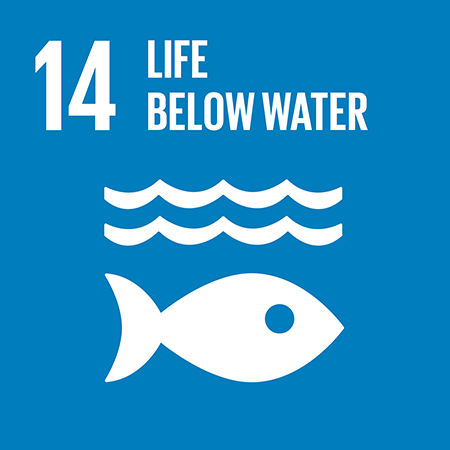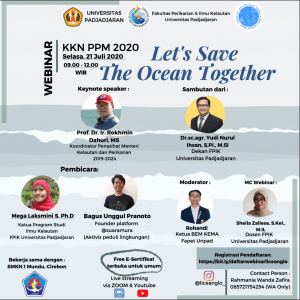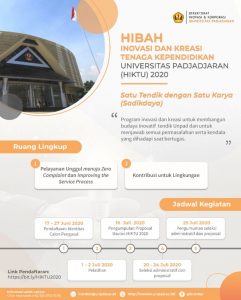
SDG 14: LIFE BELOW WATER
Aims to conserve and maintain the use of ocean, sea and coastal resources for sustainable development. The implementation of activities to achieve the targets in Goal 14, is not only beneficial for sustainable marine ecosystem management, but also has an impact on the achievement of other SDGs Goals, namely Goal 1, Goal 2, Goal 8, Goal 11, Goal 12 and Goal 13 which are the results of the analysis. scientific studies by the International Council of Science (ICSU, 2017).
Some of the targets that have been agreed in Goal 14 are: (i) preventing and reducing marine pollution, especially from land, including marine debris and nutrient pollution; (ii) protect and sustainably manage marine and coastal ecosystems; (iii) minimize and address the impact of increasing acid levels in the sea and (iv) regulate the harvesting of fish at sea and illegal, unreported, and unregulated (IUU) fishing; and (v) conservation of at least 10% of marine and coastal areas according to scientific information; (vi) maintaining subsidies that encourage overcapacity and overfishing and that encourage IUU fishing; (vii) increasing the economic benefits of the sea to communities in small island countries and developing countries by sustainable use of marine resources, including through sustainable fisheries management, aquaculture and tourism.
Supporting aquatic ecosystems through education
- Fresh-water ecosystems (community outreach)
- Sustainable fisheries (community outreach)
- Overfishing (community outreach)

1)Training about data sampling and analysis of plankton and benthos
Unpad offers educational programs on fresh-water ecosystems (water irrigation practices, water management or conservation) for local or national communities . To support the fresh-water ecosystem, the Center of Environment and Sustainability of Unpad conducted training about data sampling and analysis of plankton and benthos for five days in February 2020. The purpose of this training is to know the correct sampling and analysis of plankton and benthos, so as to provide accurate information about the condition of the waters.
Training about data sampling and analysis of plankton and benthos
2) Socialization of irrigation system at greenhouse based on the Internet of things
Besides training at the river, Unpad through community service activity socialized an irrigation system at greenhouse based on the Internet of things. This research was held by Prof. Dr. Nurpilihan Bafdal., Ir., M.Sc from the Faculty of Agricultural Industrial Technology.
Socialization of irrigation system at greenhouse based on the Internet of things
Empowerment of fishing village communities in Kerakas Village, Lombok Utara
University offers educational programmes or outreach for local or national communities on sustainable management of fisheries, aquaculture and tourism. There are some programs from lecturers held in fishing villages. one of the programs was conducted on November 8, 2019, and is located in Fisherman’s Village, Segara Village, North Lombok Regency, NTB. This activity was attended by as many as 26 participants who are fishing village communities. This activity is carried out to improve the welfare of the community in addition to utilizing existing groups in the community itself. Empowerment of fishing village communities in Kerakas Village, Lombok Utara
Webinar KKN-PPM 2020, “Let Save the Ocean”
Unpad contributes to activities for local or national communities to raise awareness about overfishing, illegal, unreported and unregulated fishing and destructive fishing practices

The KKN-PPM program is a community service program based on research, studies, or studies in an area. One of the KKN-PPM programs held by civitas academia Unpad is about fisheries in Cirebon Regency, West Java. One of the series of the event was Webinar KKN-PPM 2020, “Let Save the Ocean”
Supporting aquatic ecosystems through action
- Conservation and sustainable utilisation of the oceans (events)
- Food from aquatic ecosystems (policies)
- Maintain ecosystems and their biodiversity (direct work)
- Technologies towards aquatic ecosystem damage prevention (direct work)

1) Festival membumikan laut sebagai masa depan bangsa
Unpad supports or organizes events aimed to promote conservation and sustainable utilization of the oceans, seas, lakes, rivers, and marine resources . Together with The Ministry of Maritime Affairs and Fisheries (KPP) of the Republic of Indonesia, Padjadjaran University (Unpad) held a Talk Show and Exhibition: Festival of Earthing the Sea as the Future of the Indonesian Nation at Graha Sanusi Hardjadinata Unpad
Festival membumikan laut sebagai masa depan bangsa
2)Webinar about conservation and sustainable utilisation of the oceans
In addition, there are some events related to conservation and sustainable utilisation of the oceans such as
Webinar Fisheries for Archipelago
Seminar bincang laut 2020
Canten management to make sure the quality of food
Unpad has a policy to ensure that food on campus that comes from aquatic ecosystems is sustainably harvested. To make sure the quality of food source, Unpad has Rule of Rector about canteen management. Every holder of Canteen Management Permit must
1) maintain food health and hygiene, environmental hygiene, and the beauty, order, and preservation of garden facilities and public facilities in the environment around the Canteen
2) if there are more than 2 (two) Canteen Managers in 1 (one) location, then they are obliged to form the management to regulate the Canteen in terms of payment, hygiene, food health, variety of food, environmental hygiene, as well as order and quality of service
3) maintain the canteen environment by paying attention to the level of hygiene, cleanliness, health, and halal of food
4) maintain the quality of food and the cleanliness of utensils and equipment used in providing food
5) comply with and implement food quality requirements and minimum service standards
Canten management to make sure the quality of food

Citarum Center of Reseach
Unpad works directly (research and/or engagement with industries) to maintain and extend existing ecosystems and their biodiversity, of both plants and animals, especially ecosystems under threat . Citarum is a river that is the pulse of most of the people of West Java. Unfortunately, this 270 km long river was included in the World Bank’s list of the dirtiest rivers in the world in 2018. This is because Citarum pollution has been categorized as heavy and has a high sedimentation rate. Unpad contributed to efforts to deal with problems in Citarum. One of them is to establish the Citarum Research Center or Citarum Center of Research (CCR). CCR Unpad was established following the need for academic perspectives in solving problems in Citarum. Therefore, research activities at CCR are not only focused on one scientific field but are multidisciplinary.
 1)Drone as an effective tool to support research into detailed environmental conditions
1)Drone as an effective tool to support research into detailed environmental conditions
Unpad works directly (research and/or engagement with industries) on technologies to minimize or prevent damage to aquatic ecosystems . Cipta Endyana, a lecturer at the Faculty of Geological Engineering and the Graduate School of the University of Padjadjaran (Unpad) uses drones as an effective tool to support research into detailed environmental conditions. Cipta uses drones to obtain images that are usually obtained from satellite imagery to map land conditions in the upstream area of the Citarum Watershed.
Drone as an effective tool to support research into detailed environmental conditions
2)Marine Instruments and Data Portals for Archipelagic and Island Countries
Three lecturers of FPIK Unpad, among others, Lecturer of Marine Science Study Program Noir Primadona Purba, M.Sc., and two Lecturers of Fisheries Study Program Alexander M.A. Khan, PhD, and Ibn Faizal, M.T. Noir and his team conducted a research entitled “Development of Marine Instruments and Data Portals for Archipelagic and Island Countries”. This research will produce an output in the form of a monitoring tool capable of diving to a depth of 200 meters below sea level. In addition, the research will also provide a marine data portal that can be used free of charge.
Marine Instruments and Data Portals for Archipelagic and Island Countries
Water sensitive waste disposal
- Water discharge guidelines and standards
- Aquatic plan to reducing plastic waste
- Reducing marine pollution (policy)
University has water quality standards and guidelines for water discharges (to uphold water quality in order to protect ecosystems, wildfire, and human health and welfare). Sustainable management and utilization of aquatic resources are the responsibility and obligation of the academic community, education staff, work units, and anyone at UNPAD.
Water usage includes: planning, controlling, and using groundwater resources through technology management and behavior change, restoring and maintaining sources of deep ground water, surface ground water, and surface water with the principle of water conservation so as to ensure their availability for continuous teaching and learning activities.
Based on Rule of Rector Number 22 of 2021 about Management of Eco-Friendly Campus at Universitas Padjadjaran. Water Conservation includes
a.Water management policy;
b.Regulation and control of water usage;
c.Efficiency of clean/fresh water usage;
d.Efficiency of water distribution with faucets;
e.Water quality;
f.Water treatment, recycling, and storage;
g.Water filtration;
h.Reduction in the manufacture/use of deep wells;
i.Zero runoff and infiltration wells;
j.Conservation and reforestation of water catchment areas;
k.Conservation and maintenance of water sources
Rule of Rector Number 22 of 2021 about Management of Eco-Friendly Campus at Universitas Padjadjaran
University has an action plan in place to reduce plastic waste on campus. One of the foundations of Eco-Friendly Campus at Unpad is Prohibition and reduction of the use of single-use plastics in the form of drinking water packaging made of single-use plastics, single-use plastic bags, plastic-based food wrappers, plastic-based eating and drinking utensils and backdrops, and plastic-based banners in the context of the principles of reduce, reuse, recycle, and reject
Management of Eco-Friendly Campus Of Universitas Padjadjaran
University has a policy on preventing and reducing marine pollution of all kinds, in particular from land-based activities. Management and utilization of aquatic resources are carried out by:
a. Sustainable utilization of biological and non-biological resources;
b. Activities of Tridharma Perguruan Tinggi (Three Pillars of Higher Education) in a wise and sustainable manner and by paying attention to the preservation of
biological and non-biological resources.
In addition, Management and utilization of water resources are carried out through the following activities:
a. protection of fish habitats and populations;
b. rehabilitation of fish habitats and populations;
c. research and development;
d. utilization of fish resources and environmental services;
e. socio-economic development of the community;
f. supervision and control; and/or
g. monitoring and evaluation.
Rule of Rector Number 21 of 2021 about Reduction of Aquatic Population at Universitas Padjadjaran
Maintaining a local ecosystem
- Minimizing alteration of aquatic ecosystems (plan)
- Monitoring the health of aquatic ecosystems
- Programs towards good aquatic stewardship practices
- Collaboration for shared aquatic ecosystems
- Watershed management strategy
Management of Eco-Friendly at Universitas Padjadjaran
University has a plan to minimise physical, chemical and biological alterations of related aquatic ecosystems. The Management of the Eco-Friendly Campus Program of Unpad refers to the following Green Campus
benchmarks
Security, Safety, Health, and Comfort at Work
a.Air circulation;
b.Ambien air quality;
c.Arrangement of non-smoking area;
d.Monitoring and greenhouse effect, especially CO2 and CO;
e.Chemical and natural pollutants;
f.Biological pollutants;
g.Physical comfort;
h.Noise measurement;
i.Adequacy of work spaces;
j.Room lighting quality;
k.Use of personal protective equipment when working with high risks;
l.Sanitation system
Water Conservation
a.Water management policy;
b.Regulation and control of water usage;
c.Efficiency of clean/fresh water usage;
d.Efficiency of water distribution with faucets;
e.Water quality;
f.Water treatment, recycling, and storage;
g.Water filtration;
h.Reduction in the manufacture/use of deep wells;
i.Zero runoff and infiltration wells;
j.Conservation and reforestation of water catchment areas;
k.Conservation and maintenance of water sources
1)Monitoring of waters for aquaculture in Babakan Village, Pangandaran by lecturers
Unpad monitors the health of aquatic ecosystems in Pangandaran. This water monitoring assistance activity aims to provide information regarding the causes of fish mortality in floating net cages in Babakan village, Pangandaran Regency. The problem faced by farmers is the death of fish that often occurs. For this reason, the method used is the integration of research results, field observations, and mentoring. The implementation method is by direct observation and direct measurement of water parameters such as brightness, DO, temperature, current, and salinity of the waters. Furthermore, the interpretation is done by looking at the existing fish commodities so that the cause of fish death can be explained. This assistance is provided to the Karang Taruna group managing KJA and students of KKN (Real Work Course). The water quality results show that the water parameters in the KJA are no longer suitable for cultivation due to slow currents, low brightness, high temperatures. The result of the activity is that the cultivation group and students know how to monitor waters and the causes of fish mortality and get information about one of the uses of RHEA as a measuring tool for monitoring water conditions. In this case, RHEA can be used to monitor waters.
Monitoring of waters for aquaculture in Babakan Village, Pangandaran by lecturers
2)Underwater monitoring for archipelagic and island states
Three lecturers of FPIK Unpad, among others, Lecturer of Marine Science Study Program Noir Primadona Purba, M.Sc., and two Lecturers of Fisheries Study Program Alexander M.A. Khan, PhD, and Ibn Faizal, M.T. Noir and his team conducted a research entitled “Development of Marine Instruments and Data Portals for Archipelagic and Island Countries”. This research will produce an output in the form of a monitoring tool capable of diving to a depth of 200 meters below sea level. In addition, the research will also provide a marine data portal that can be used free of charge.

1)grant Hibah Inovasi dan Kreasi Tenaga Kependidikan Universitas Padjadjaran (HIKTU)
Unpad develops and supports programs and incentives that encourage and maintain good aquatic stewardship practices in 2020, Unpad provided a grant, Hibah Inovasi dan Kreasi Tenaga Kependidikan Universitas Padjadjaran (HIKTU). This grant was offered to lecturers and they can choose one of two themes. One of the choices was “environmental contribution”. Grant Hibah Inovasi dan Kreasi Tenaga Kependidikan Universitas Padjadjaran (HIKTU)
2)PPM Unpad Guideline 2020
There is research agenda at Unpad such as community outrech (PPM). in 2020, one of the focused issues was related to the environment
1)Beach clean up at Summer Program 2019
Unpad collaborates with the local community in efforts to maintain shared aquatic ecosystems. Unpad held Unpad Summer Program 2019 to invite foreign students to introduce culture and tourism place in Pangandaran, West Java. There were 53 participants from 12 countries who join this program. The activities were beach clean-up activities in Pangandaran beach, traditional dance, and kite festival. With this event, the participants knew about culture in Pangandaran, West Java.
Beach clean up at Summer Program 2019
2)Collaboration with Bakamla RI and Philipine Coast Guard, exchanging best practices in managing security and safety at sea
Bakamla RI Increased Cooperation with Philippine Coast Guard, Holds Online Meeting. This online meeting was a form of cooperation in the context of exchanging best practices in managing security and safety at sea between the two agencies. In relation to implementing the IMO Convention, Bakamla RI had received support from the Faculty of Law, University of Padjadjaran (Unpad). This meeting was held to discuss and learn about the best practices carried out by the PCG in terms of implementing the IMO Conventions in the Philippines. It is known, one of the main tasks of the coast guard is to maintain safety in the sea area. This activity is part of a series of studies on the role of the coast guard in implementing the IMO Conventions prepared by the Indonesian Bakamla and in collaboration with the Faculty of Law Unpad.
Transdisciplinary Effective Approach to Solve Citarum Problems
Unpad has implemented a watershed management strategy based on location specify diversity of aquatic species
The Citarum River holds complex, interrelated, and uncertain problems. However, this problem can push Citarum to become the epicenter for many research topics in various scientific sectors. This was conveyed by the Professor of the Faculty of Mathematics and Natural Sciences (FMIPA) Universitas Padjadjaran Prof. Parikesit, M.Sc., Ph.D. in the online seminar “The Role of Research and Innovation in Promoting Sustainable Citarum River” which was held in the context of Unpad’s 63rd Anniversary, Wednesday (19/8). He mentioned that the problems in Citarum formed a web of problems. According to him, Citarum needs a quick solution to respond to the pessimism that arises due to increasingly worrying conditions. What is needed is not just environmental awareness, but a paradigm on how to build a sustainable society. Transdisciplinary Effective Approach to Solve Citarum Problems
